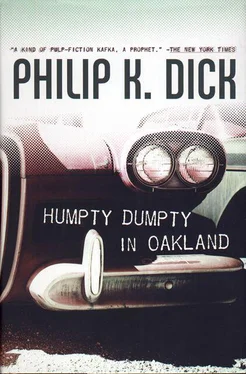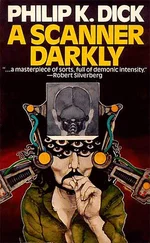“Look,” he said. “Harman? Mr. Harman?”
“Just a moment,” the girl said. “I’ll connect you with Mr. Harman.” A series of clicks, a wait. Then a man’s voice.
“Yes, this is Harman.”
“This is Fergesson,” he said. “I’m interested in that place but I can’t get hold of Mr. Bradford.”
“Oh yes,” Harman said, sounding puzzled for a moment.
“I went up there but he wasn’t there.”
After a pause Harman’s voice said, “My friend, I’ve been thinking about you and this business. I think what you better do—have you got an attorney or not?”
“No,” Fergesson said.
“Well, who drew up the papers on your garage?”
“Matt Pestevrides. Real-estate broker.”
Harman said, “It seems to me if you’re going to deal with Bradford you should deal through somebody. There’s no offense intended in my saying this. I think, though, Jim, you’d really be a lot better off if you could deal through a representative who’s used to operators like Bradford. Who can—do you know what I mean?—talk their language.”
“I want that place,” Fergesson said.
“The auto repair?”
“I want to buy it!” he said loudly in Harman’s ear. The racket of his voice jangled back.
“Well, look,” Harman said. “Get a lawyer. Have him approach Bradford. Have him tell them he’s got an interested party who wants to know more. He’ll know how to approach them. Probably Bradford and his associates already have a prospectus drawn up; you know what that is, its a financial statement giving all the particulars. Have your lawyer go over it and see what he thinks. Or get hold of an investment broker. Somebody who’s used to this sort of thing. Or bring it to me, if you want.”
“I’ll take it to Tsarnas.” That was the Bulgarian property attorney who had handled the papers on his garage when he had first bought it. “Thanks.”
“If you want I’ll give you the name of my own attorney,” Harman said. “He’s very good.”
“No.” His chest was beginning to hurt again. “Thanks.” He hung up the phone.
Why, he thought, couldn’t he see Bradford? Why did he have to work through somebody else? Bradford was like God, up in the sky, unseen; known only by his works. The big men, the financiers, would hear of Jim Fergesson indirectly and by degrees; the awareness of Fergesson would creep up gradually if it crept up at all. And how important would that be to them? How much would it count? But he had made up his mind to go ahead.
Dialing, he called Tsarnas’s office. Tsarnas’s daughter answered.
“Let me talk to Boris,” he said. “This is Fergesson.”
He told Tsarnas to find out about Marin Country Gardens and then, when he had hung up, he opened the desk drawer and found a Dutch Masters cigar still wrapped in cellophane. The cigar tasted good and he was able to relax. Down in his chest the pain was an ache, dull and uniform, going on like a pulse.
Outside the office were cars to be worked on, cars with metallic dust on their hoods from the valve-grinding of the past days. One Plymouth was up on its end, suspended by the hydraulic hoist; he had not remembered to let it down. The Plymouth had been upright for three days. It was a wonder the air had not leaked out of the hoist. After he had smoked the cigar he left the office and took tools from the workbench. He kicked the wooden flat-can out and lowered himself onto it.
Once again he was beneath a car, down in the cold darkness, among the indistinct shapes. He found the protected electric bulb on its cord and dragged it beside him; the yellow area spread out over the transmission and flywheel of the car.
When he rolled to pick up a socket wrench his chest cracked. At it his mouth flew open and he let the wrench go. The pain, as it had been, hopped back and was there again, as before. The pain settled on him and he could not breathe. Through his mouth he swallowed air, wheezing as if his throat were clogged.
“Fuck,” he said, when he could speak, and rolled back onto his shoulders. He lay face up, his arms at his sides, seeing the blaze of the electric bulb. Something was wrong inside him. A permanent thing had broken. He had not recovered.
For a time he lay under the car and then he slid the cart out. He threw his tools on the bench and walked to the office. For an hour he sat doing nothing. The time was three-thirty and he had not eaten since six. In the white sunlit entrance of the garage the outlines of people passed. He wondered if anybody would come in. If so, maybe they could get him a sandwich at the café down the street.
Late in the afternoon, after the heat had left the sun’s rays, Al Miller got out the gallon jug of polish and began polishing a 1954 Oldsmobile which he had picked up from a wholesaler. While he waited for the polish to dry he turned on the hose and began washing off his other cars; he slung the hose here and there. The glare this time of day was intense, and he had put on his dark glasses. Because of the glare he kept his back to the street and sidewalk.
As he moved behind a car he turned and caught sight of someone coming toward him, a figure that had already gotten onto the lot without him noticing. Walking very fast, the woman approached him in a straight line. She bore down on him as he stood with the drizzling hose in his hands; shading his eyes he tried to make out who it was, if it was someone he knew. Often women who wanted parking-meter change came that way, so rapidly and purposeful.
The woman, broad, middle-aged, suddenly began to yell at him in a high voice, “Oh, you terrible person, you standing here. You doing nothing like always.” She repeated her words several times, jumbling them together; he stared at her open-mouthed, taken completely aback.
The woman, he saw now, was Lydia Fergesson.
“Just stand there!” she yelled at him, her face elongated, drawn out, made over from inside. “Never do anything in the wide world except for yourself, you selfish dreadful man.”
“What?” he said, moving to shut off the hose.
Lydia pointed at the garage.
“He isn’t there,” Al said. “He’s been gone all day. I looked in around two.”
Her mouth opened and she said, “He lay in there sick.”
Oh my God, Al thought. The thing did happen. “What kind of sick?” he said. “Will you tell me?” His own voice rose, almost as shrill now as hers. “You hysterical foreign nut!” he yelled at her, standing so close to her that he could see every pore of her skin, every wrinkle and line and hair. She backed away a step, showing fear. “Get out of here,” he yelled. “Get off my lot.” As she retreated he ran after her. “What happened to him?” he yelled, dropping the hose and grabbing hold of the sleeve of her coat. “Tell me!”
She said, “He had an attack.”
“Where is he?”
“At home.” Her voice was lower, without the accusation. “A good customer who has fondness and care for him happened to come and find him sitting in the office; he could not even call. And he was driven to the doctor who took X-rays and taped him.”
Some of Al’s fear vanished. “You made it sound like he was dead. Like he croaked.” He was shaking and his voice wavered.
“Good-bye,” Lydia said. “I came down here by cab in order to tell you what your attitude might have done.”
“What attitude?” He followed her to the edge of the lot. There, in a parking slot, was the cab, new, yellow and shiny; the driver sat reading the newspaper. “I’ll drive you back to the house,” he said. “Is it okay to see him? Can I see him and see how he is?”
Lydia said, “Will you drive with care?”
“Sure,” he said, already going to his best car, the Chevrolet, opening the door and starting up the motor, racing the motor by pushing down on the foot pedal. Then he strode over to the parked cab and paid the driver. Returning, he found that Lydia had already gotten into the Chevrolet, in the back seat. She sat staring ahead, her face expressionless . . . on purpose, he decided as he got in front, behind the wheel. Came down here to make me feel bad because I didn’t find him.
Читать дальше










